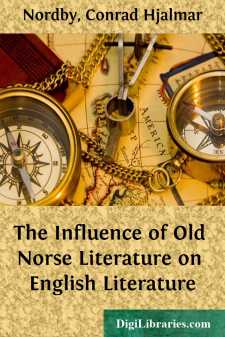Categories
- Antiques & Collectibles 13
- Architecture 36
- Art 48
- Bibles 22
- Biography & Autobiography 813
- Body, Mind & Spirit 142
- Business & Economics 28
- Children's Books 17
- Children's Fiction 14
- Computers 4
- Cooking 94
- Crafts & Hobbies 4
- Drama 346
- Education 46
- Family & Relationships 57
- Fiction 11829
- Games 19
- Gardening 17
- Health & Fitness 34
- History 1377
- House & Home 1
- Humor 147
- Juvenile Fiction 1873
- Juvenile Nonfiction 202
- Language Arts & Disciplines 88
- Law 16
- Literary Collections 686
- Literary Criticism 179
- Mathematics 13
- Medical 41
- Music 40
- Nature 179
- Non-Classifiable 1768
- Performing Arts 7
- Periodicals 1453
- Philosophy 64
- Photography 2
- Poetry 896
- Political Science 203
- Psychology 42
- Reference 154
- Religion 513
- Science 126
- Self-Help 84
- Social Science 81
- Sports & Recreation 34
- Study Aids 3
- Technology & Engineering 59
- Transportation 23
- Travel 463
- True Crime 29
The Influence of Old Norse Literature on English Literature
Categories:
Description:
Excerpt
INTRODUCTORY.
It should not be hard for the general reader to understand that the influence which is the theme of this dissertation is real and explicable. If he will but call the roll of his favorite heroes, he will find Sigurd there. In his gallery of wondrous women, he certainly cherishes Brynhild. These poetic creations belong to the English-speaking race, because they belong to the world. And if one will but recall the close kinship of the Icelandic and the Anglo-Saxon languages, he will not find it strange that the spirit of the old Norse sagas lives again in our English song and story.
The survey that this essay takes begins with Thomas Gray (1716-1771), and comes down to the present day. It finds the fullest measure of the old Norse poetic spirit in William Morris (1834-1896), and an increasing interest and delight in it as we come toward our own time. The enterprise of learned societies and enlightened book publishers has spread a knowledge of Icelandic literature among the reading classes of the present day; but the taste for it is not to be accounted for in the same way. That is of nobler birth than of erudition or commercial pride. Is it not another expression of that changed feeling for the things that pertain to the common people, which distinguishes our century from the last? The historian no longer limits his study to camp and court; the poet deigns to leave the drawing-room and library for humbler scenes. Folk-lore is now dignified into a science. The touch of nature has made the whole world kin, and our highly civilized century is moved by the records of the passions of the earlier society.
This change in taste was long in coming, and the emotional phase of it has preceded the intellectual. It is interesting to note that Gray and Morris both failed to carry their public with them all the way. Gray, the most cultured man of his time, produced art forms totally different from those in vogue, and Walpole said of these forms: "Gray has added to his poems three ancient odes from Norway and Wales ... they are not interesting, and do not, like his other poems, touch any passion.... Who can care through what horrors a Runic savage arrived at all the joys and glories they could conceive—the supreme felicity of boozing ale out of the skull of an enemy in Odin's Hall?"
Morris, the most versatile man of his time, found plenty of praise for his art work, until he preached social reform to Englishmen. Thereafter the art of William Morris was not so highly esteemed, and the best poet in England failed to attain the laurel on the death of Tennyson.
Of this change of taste more will be said as this essay is developed. These introductory words must not be left, however, without an explanation of the word "Influence," as it is used in the subject-title. This paper will not undertake to prove that the course of English literature was diverted into new channels by the introduction of Old Norse elements, or that its nature was materially changed thereby. We find an expression and a justification of our present purpose in Richard Price's Preface to the 1824 edition of Warton's "History of English Poetry" (p....


